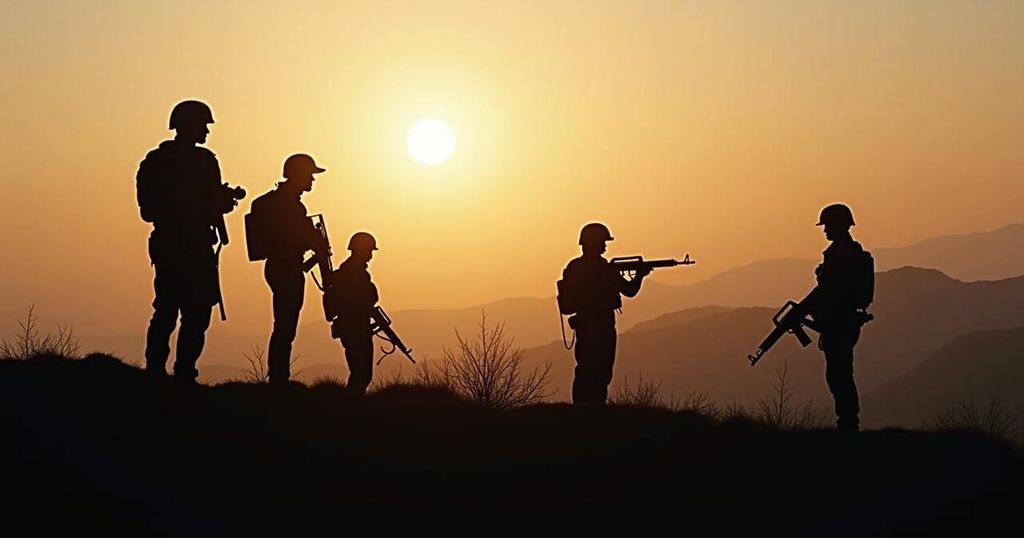Israel has engaged in targeted ground operations against Hezbollah in southern Lebanon, alongside airstrikes, despite U.S. calls for a ceasefire. President Biden advocates for negotiations, while Iran warns of repercussions against Israel. Hezbollah remains committed to resistance, intensifying the conflict. Diplomatic efforts from the U.S., UK, and Canada emphasize an urgent need for a ceasefire as tensions escalate.
On a recent Monday night, the Israeli Defence Forces launched targeted ground raids against Hezbollah in southern Lebanon, performing airstrikes and artillery bombardments in close proximity to Israel’s northern border. This military action has occurred amidst escalating international calls for a ceasefire. President Joe Biden voiced his opposition to the ground operations, advocating for immediate cessation of hostilities and promoting negotiation efforts to restore peace. Despite this, Israel continued its operations, alerting the United States to their plans, which raised concerns about the potential for a prolonged conflict with Iran. Prime Minister Benjamin Netanyahu issued a stern warning to Tehran, asserting, “no place” in the region is safe from Israeli reach, while emphasizing Israel’s desire for peace with the Iranian populace despite accusations against their leadership for funding regional hostility. In response, Iran’s Foreign Ministry remarked that Israel’s actions would not remain unpunished, indicating a readiness to respond at a suitable time. Hezbollah’s deputy chief, Naim Kassem, reaffirmed the group’s commitment to combatting Israel’s incursions, expressing readiness for prolonged conflict as they sustain losses among their leadership due to Israeli strikes. Additionally, U.S. Secretary of Defence Lloyd Austin warned Iran of potential “serious consequences” should it engage in hostilities against Israel, while Syria reported intercepting Israeli attacks over Damascus, resulting in civilian casualties. The Pentagon announced cooperation between the U.S. and Israel in efforts to dismantle what they term terror infrastructure along the Lebanese border, amid rising international calls for a ceasefire, particularly emphasized by the United Kingdom. Tension escalated following an Israeli strike targeting Mounir Maqdah, a commander of the Palestinian Fatah movement, in a crowded refugee camp in southern Lebanon. Iran’s ambassador to India reflected on the death of Hezbollah leader Hassan Nasrallah, regarding it as a significant loss for humanity, signifying the complex interrelations in the region. Amidst these developments, the Canadian Foreign Minister Melanie Joly communicated urgency for the G7 nations to apply pressure on Israel to cease hostilities, underscoring the concern over potential larger scale conflicts in the region.
The conflict between Israel and Hezbollah has seen significant escalations in recent days, marked by Israeli military operations in southern Lebanon and ongoing exchanges of hostilities. Tensions involving Iran’s influence in the region also play a crucial role in escalating these confrontations, underlined by the integral alignments and animosities affecting regional dynamics. The effects of these military actions have raised alarms internationally regarding potential broader conflicts, prompting calls for diplomatic efforts and ceasefires. Recent airstrikes, both from Israel and in response from Iran and Syria, have further complicated an already volatile situation.
In conclusion, the situation along the Israel-Lebanon border remains precarious, characterized by ongoing military confrontations amid international calls for de-escalation and peace negotiations. The involvement of regional powers such as Iran accentuates the conflict, with each party reaffirming its refusal to back down. Diplomatic interventions from the U.S. and allies are critical in navigating the potential fallout and working towards a peaceful resolution, although the prospects remain uncertain given the current hostilities and entrenched positions.
Original Source: www.hindustantimes.com






